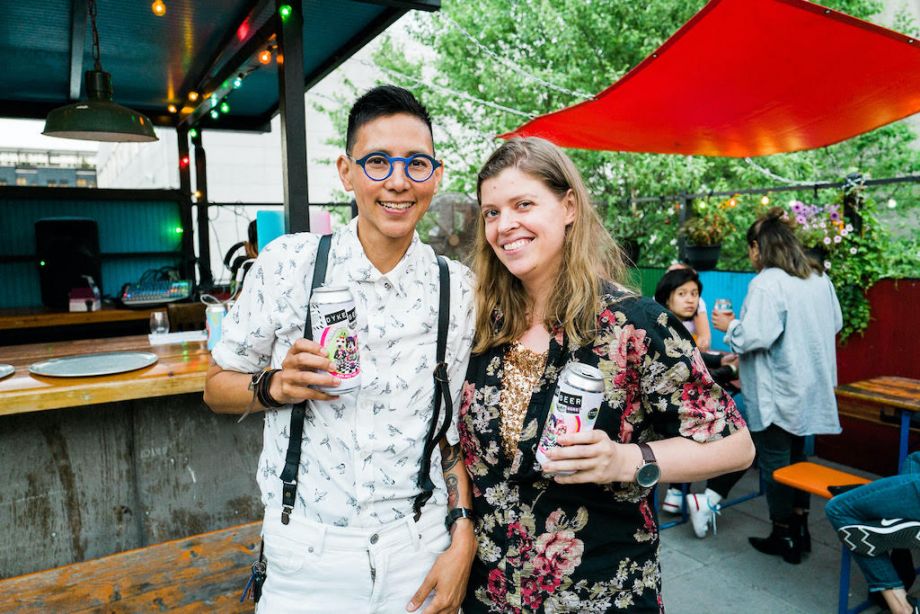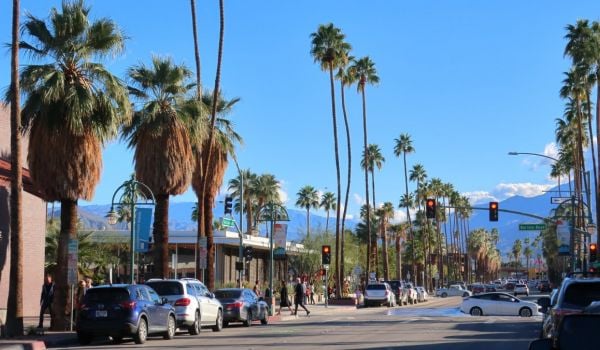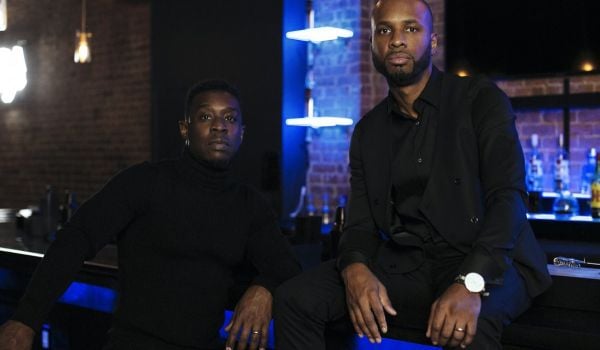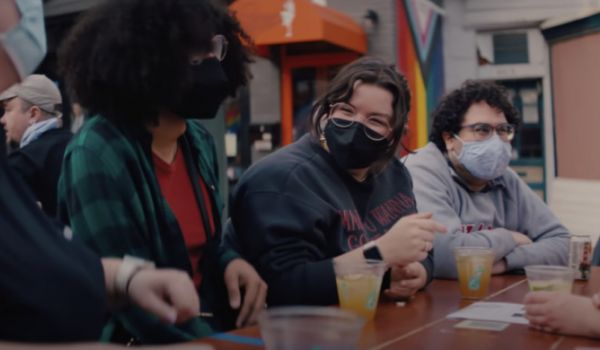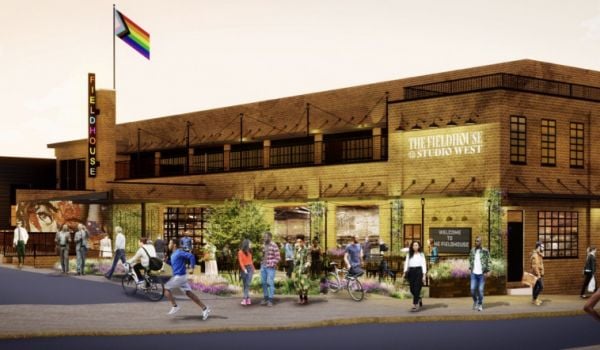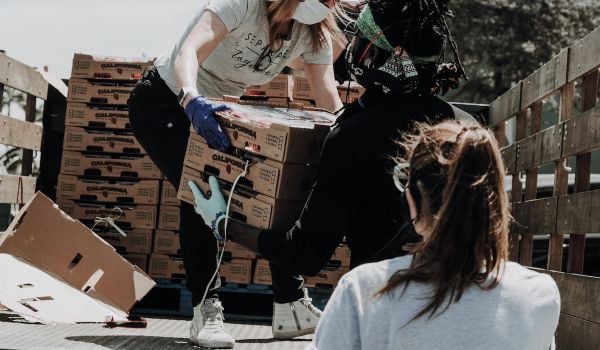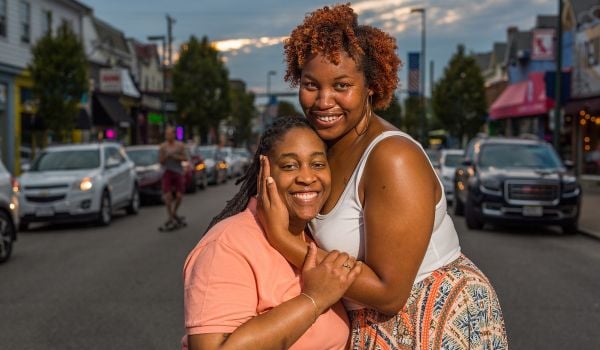It was the first night of the new normal, for many their first night out in New York City since the start of the pandemic, at a rooftop party on a Saturday evening, at a brewery in Brooklyn’s posh Greenpoint neighborhood.
The “new” part was the beer just about everyone was enjoying — Dyke Beer, created by the organizers of the party as a way of carving out spaces for their community that celebrate who they are instead of underestimating, ostracizing or attacking them. Founded last fall during the depths of the pandemic, Dyke Beer is one of a few emerging craft brewers in the LGBTQ community, and the only one so explicitly branded with the “Dyke” label, once and often still used as a derogatory slang term for a lesbian.
“I believe that gay men and dykes and everyone who’s queer deserves the same space as straight people,” says Sarah Hallonquist, one-half of the Dyke Beer founding team. “When you say that out loud, it seems obvious, but in reality, we don’t have these things. That’s why we’re fighting so hard for them.”
In 1980, there were 200 lesbian bars across the United States, but today there are 21, according to a new documentary produced by The Lesbian Bar Project, a campaign to support those remaining lesbian bars. Three are in New York City, including Henrietta Hudson, which is featured in the documentary alongside A League of Her Own in Washington, D.C. and Herz in Mobile, Alabama.
“We’re trying to create spaces where we can include people who have always felt like they’re othered or not belonging,” says Loretta Andro Chung, the other half of the Dyke Beer founding team.
About four years ago, a group of artists and activists in New York formed NYC Dyke Bar Takeover, “dedicated to creating and supporting Queer space for self-identified women, transgender and non-binary people of all races.” The group would rent out straight bars and other spaces in New York to organize “takeovers,” — parties for their community in a space not typically associated with them. There are also chapters in other cities.
Hallonquist and Chung met at a NYC Dyke Bar Takeover, and the two became friends over their mutual love of beer — Hallonquist first started messing around with home brewing while in college in Massachusetts. Chung is big on European beers — she once traveled to the town in the Czech Republic where “Budweiser” gets its name, to try the original, which tastes nothing like the mass-produced Americanized version.
The pair eventually became part of the organizing team behind NYC Dyke Bar Takeover. And then last year, the pandemic hit. All that stopped.
“It was time to reflect and think okay when things go back to normal, do we just do Dyke Bar Takeover as it is or do we expand or do something different as organizers and activists?” Hallonquist says.
Dyke Beer emerged from the conversation as the something different. “People first thought we were just gonna do these 200 cases of beer and call it a day and it was just like this fun thing we did for an activist group,” Hallonquist says. “And it was like, no, we are creating an LLC right now. We wanna make this a business.”
Creating a recipe was the easy part for two beer fanatics — the main ingredients for beer are water, hops, malted grain (usually barley) and yeast.
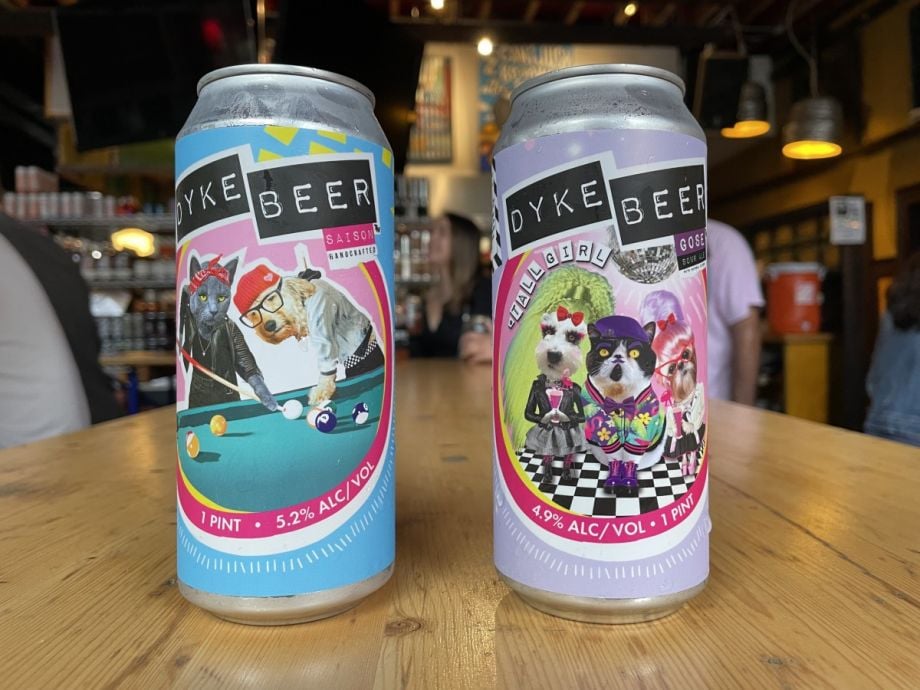
(Photo courtesy: Oscar Perry Abello)
“There are these yeast laboratories that create different strains based on the beer type, and will tell you exactly what the flavors are that the yeast will display,” Hallonquist says. “It’s pretty amazing all the strains that are out there and what the choices are and how these scientists really understand how they make it in the beer.”
Eventually they want to have their own craft brewery and pub, hopefully with a rooftop for events.
“It’s also creating new histories for us,” says Chung. “So much happens at a bar. It’s also a community center. It’s a good place for networking. In the past it’s been a good place for activism and organizing, where those meetings get done.”
But to start out quickly and using only their own savings from their day jobs in the corporate world, they needed to find an existing brewery to partner with them on their first batch.
That was the hard part. They started looking in upstate New York, where prices are lower for contract brewing — that’s where a small or nascent craft brewer pays a facility to rent their brewing equipment and staff to produce and store their beer.
But that can be a tough world to navigate if you are coming in as two women with a story and a brand like “Dyke Beer.”
“It would be easier to have our own brewery and not deal with the world of breweries, it’s very white-male dominated,” says Chung, who is half-Peruvian, half-Chinese and grew up speaking Spanish at home.
Recently, Instagrammer “ratmagnet” compiled a ten-part instagram story series with hundreds of stories submitted to them by women in the brewing industry being patronized, sexually harassed or assaulted by their male colleagues.
“The brewers didn’t necessarily say no, but it was a lot of older, white, straight men who just didn’t understand what we were doing or what we were saying, didn’t really want to be involved, so they said ‘oh we’re full’ or ‘we need more capacity,’” Hallonquist says. “There was always some silly reason they gave not to work with us.”
It took 18 breweries before the Dyke Beer team found someone who said yes — Wild East Brewery, in Brooklyn, which partnered with Dyke Beer on their first offering, a saison or “farmhouse ale,” made with New York State-grown hops, Belgian Malt, and Belgian yeast with “balanced notes of bubblegum and white pepper.” Hallonquist considers it a great “gateway” to craft beers — something with more flavor and body than the typical mass-produced beer, but still approachable for someone less familiar with the bitter-tasting IPAs and double IPAs that dominate craft beer circles today.
Greenpoint Beer & Ale Co. — the location of the rooftop party — partnered with Dyke Beer to produce their second offering, a gose, a fruited sour ale made with himalayan salt, raspberries, lingonberries, and blackberries. Made specifically to release for Pride Month, the ingredients also give it a slight pink tinge that goes well with the occasion.
As new craft brewers, the pair also needs to get the word out to bars and bartenders — a challenge during a pandemic. Starting in January, they went to bars they’d frequented, or that friends recommended, anywhere with outdoor seating. Hallonquist says they’ve pitched to around 300 bars and other craft beer sellers so far.
To help explain their goals as a business, they created a zine to handout with the sample of the beer they’d offer bartenders. The zine explains the word “dyke” and tells a little bit about the history of lesbian bars vanishing across the country. Chung remembers one craft beer seller asking, genuinely, about the use of the word “dyke” and whether he as a straight white cis man could say it.
“He knew that Dyke was a derogatory term, but we explained to him we’re reclaiming it the way some like the Dyke March are reclaiming it and saying we’re here, we’re queer, we are dykes and we are visible,” says Chung.
Not everyone has been into it, and that’s okay.
“You can kind of feel out the reactions of people towards your existence,” Hallonquist says. “There’s an excitement, but also it’s a little scary, because you don’t know who you’re going to interact with when you go into these bars or craft beer stores. You don’t know who’s working there. So you just try your best.”
Interestingly, other than the remaining open lesbian bars in New York (Cubbyhole and Henrietta Hudson), Hallonquist says Dyke Beer has been received better by straight bars versus most gay bars — which tend to cater mostly to white gay cis men.
“Where Dyke Bar Takeover really was for queers, Dyke Beer is almost for straight people, which is like a strange thing to say,” says Hallonquist. “But the idea was to have more queer or dyke visibility in this extremely straight market of craft beer.”
Hallonquist also says most gay bars have seemed less interested in changing their usual routine, or maybe turned off by the upfront use of the word “dyke.” Plus, they have a largely captive audience, and they know it, so there’s less motivation to differentiate themselves with a new craft beer made by self-identified dykes.
“They want to just keep buying the lowest cost beers since they know queer people will just come into their bars because there’s such a lack of queer space,” Hallonquist says. “It’s a business model but it’s kind of terrible. I believe that we deserve better.”
At least one of the Dyke Beer offerings is now available at nearly 60 locations and counting across New York City. The demand for the saison is so large, especially now for Pride Month, that they moved production for the Dyke Beer Saison to a larger contract brewery out on Long Island.
“If phase I is Dyke Bar Takeover, and phase II is Dyke Beer, phase III would be Loretta and I opening a nice space up,” Hallonquist says. “A bar-brewpub, a cafe, a club, we would have a nice space that you can just relax, have a nice cocktail, a little more of an elevated experience. I love a good dive bar every now and then, but is that the only kind of space we should have? Not necessarily.”
To get there, Dyke Beer still needs to keep growing in sales — right now, all the profits get churned back into making the next batch even larger. Eventually if all goes well, some of those profits will go into finding and building out the space of their dreams.
Some of the questions they get while pitching their product to bartenders are still at least a little ridiculous. Dyke Beer started out selling in the taller 16-ounce cans instead of the more common 12-ounce cans — not necessarily by choice, as Hallonquist says there was a can shortage during the pandemic so the 16-ounce cans were the only ones available. But it’s not uncommon for craft beers to come in the larger cans, also known as “tall boys.” The new Dyke Beer brew is even labeled “tall girl gose.”
But, “a lot of bartenders at first are like, ‘can women drink this much beer?’” says Hallonquist. “You wouldn’t believe how common that question is and I’m just like, it’s four more ounces. It’s a pint of beer. Have you seen a college party? I mean, goodness.”
This article is part of “For Whom, By Whom,” a series of articles about how creative placemaking can expand opportunities for low-income people living in disinvested communities. This series is generously underwritten by the Kresge Foundation.
Live in New York and want to try Dyke Beer? It’s available at these spots:

Oscar is Next City's senior economic justice correspondent. He previously served as Next City’s editor from 2018-2019, and was a Next City Equitable Cities Fellow from 2015-2016. Since 2011, Oscar has covered community development finance, community banking, impact investing, economic development, housing and more for media outlets such as Shelterforce, B Magazine, Impact Alpha and Fast Company.
Follow Oscar .(JavaScript must be enabled to view this email address)

